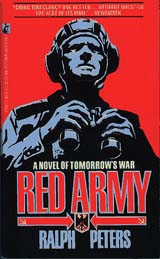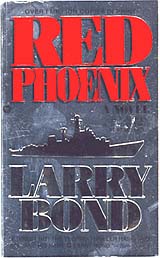
Red tide seeks to claim some of Clancy's sales
|
These reviews first appeared in the San Diego Evening Tribune in 1989.
Sir John Hackett invented the form in the early 1980s with "The Third World War"; Tom Clancy got rich popularizing it. With Clancy's techno-thrillers dominating the booksellers' charts, a lot of writers decided they, too, wanted a piece of the action.
Following in the footsteps of Clancy's two best-sellers, "Hunt for Red October" and "Red Storm Rising," came the imaginatively titled "Red Army" and "Red Phoenix."
The predictability of the titles extends into the structure and, in the case of Ralph Peters' "Red Army," throughout the book. Clancy cohort Larry Bond (he collaborated on "Red Storm Rising") shows that much of Clancy's skill in storytelling rubbed off, as the entertaining "Red Phoenix" is equal to the mentor's best work.
Both books are written in the Hacket/Clancy format: Five or six individual first-person narratives are told within the same time frame, separated by boldface headings such as "November 4 – Near Tuil, South Korea" We also get plenty of fancy descriptions of the latest military gadgets and hardware, most of which read as if taken from the pages of Soldier of Fortune magazine.
As with the Cold War spy novels that came to the fore in the 1960s and '70s, the techno-thriller is loosely based on current headlines, with most novels of the subgenre concerning purported military engagements between the United States and the Soviet Union.
Given these rather narrow parameters, it is surprising at the depth of difference in readability between the two books. In "Red Army" we see a Soviet invasion of West Germany through the eyes of, among others, a general commanding an entire army, a private in the front lines and a staff officer ashamed of his Jewish heritage.
Peters, who is an intelligence officer for the U.S. Army, is apparently well-versed in Soviet history, culture, military protocol and likely tactics in time of war. "Red Army" is purportedly an attempt to use this knowledge to shed new, sympathetic light on the thinking of Soviet soldiers.
In an author's note in the book, Peters writes, "My fundamental goal in writing this book was to attempt to bring those men to life in their rich human variety. ..."
Yet, despite this proclamation, all we get are stereotypes – not only of Russians, but of all soldiers.
To be sure, most soldiers probably do spend a majority of their time thinking about sex, whether with the wife or girlfriend back home or with future, as-yet-unknown partners. But instead of empathetic insight (or at least variety on the usual fantasies), we get the usual trio of two-dimensional characterizations: the underachieving, trouble-making NCO who will procreate with anyone, and tell everyone about it; the naive youngster who thinks of sex in pristine, romantic imagery; and the professional officer, who has to shake himself out of sadly reminiscing about the wife he a) greatly appreciates and misses, b) has grown away from and can't understand why, or c) still mourns years after her death.
Peters also gives us a re-hashing of the worn theme wherein the general's son, descended from a long line of glorious warriors who have faithfully served their nation's call, realizes he cannot be the man his father is, and ultimately dies. Give Peters credit, though – he finally eschews formula here and has the son napalmed while doubled up with diarrhea.
The pace of "Red Army" is consistently rushed, making the cliches all the more unpalatable to those not addicted to techno-thrillers.
Bond's tale, which reads much quicker than the shorter "Red Army," is of a second invasion of South Korea by communist forces. Like his teacher, he uses points of view from both sides of the conflict and shows a flair for imagination in the obligatory sexual interests.
The three main characters in "Red Phoenix" are the likable but two-dimensional fighter jock Tony Christopher; Gen. Jack McLaren, commander of all United Nations forces in South Korea; and Second Lt. Kevin Little – straight from ROTC.
While following their experiences in a second Korean war, we also see the war from the perspective of Christopher's girlfriend (head of an Army supply depot) and a North Korean general, in addition to other players who appear only briefly.
The North Koreans are presented as sympathetic characters, as Bond refuses to caricature them as evil, two-dimensional villains. While "Red Army" was about an unrealistically clean sweep through West Germany by the Russians, "Red Phoenix" contains the ebb and flow of battle. We see both success and failure from both sides of the war.
One trap Bond does fall into is the same one Clancy has been unable to escape, while Peters apparently never bothered to try – that of continually and graphically describing the physical damage caused to human bodies by modern weaponry. If it is an attempt to prove these authors do not glorify war, it fails. It is clear from the actions of the protagonists of all techno-thrillers that heroes squelch any qualms about killing other soldiers and do their duty as defined by military tradition. Pacifism is not honorable in this domain.
Despite this, Bond's book is highly readable. Unlike the characters in "Red Army," those in "Red Phoenix" are believable, and the drama is compelling.

